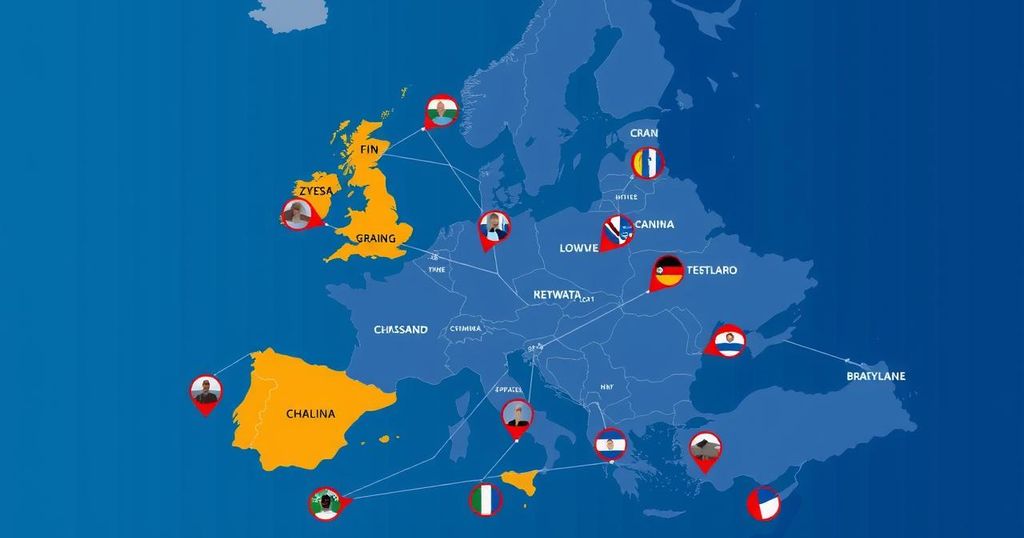European Union’s Search for Third Countries to Host Unwanted Migrants
The European Union is in search of third countries to accommodate unwanted migrants after its leaders supported new strategies for handling asylum requests. Key proposals include the establishment of “return hubs” akin to a prior UK plan to deport failed applicants to Rwanda, and relocating asylees to safe third countries. The EU’s recent summit discussions reflect the growing sway of anti-immigration voices in response to increased border crossings, particularly in the context of political shifts in member states. Notably, potential sites for these hubs include Uganda and Uzbekistan, while Italy is considering the repatriation of migrants to Syria. Implementation of these strategies poses significant legal and humanitarian challenges which must be addressed.
The European Union (EU) is actively seeking countries willing to accept migrants who have been denied asylum following recent supportive discussions among its leaders regarding innovative methods to manage migration flows. Under consideration are “return hubs,” inspired by a previously discarded British initiative to deport unsuccessful asylum seekers to Rwanda. The EU is also deliberating on relocating individuals granted asylum to safe third countries. Poland’s Prime Minister Donald Tusk has recently acquired EU approval for a controversial strategy that includes suspending the right to asylum in response to heightened border crossings, particularly from Belarus. President of the European Commission, Ursula von der Leyen, affirmed that member states must possess the ability to implement appropriate and temporary measures in such instances. The directives from a recent EU summit signify a growing influence of anti-immigration factions within the bloc, especially following hard-right election successes in Austria, Germany, and the Netherlands. However, there are significant concerns regarding the practical implementation of these policies which must comply with established laws against subjecting individuals to conflict or abuse. As von der Leyen noted, establishing return hubs presents complex issues concerning the duration of detention. While no specific nations have yet been designated for hosting these return hubs, the Dutch government has proposed Uganda as a potential location. Conversely, Italy is advocating for the repatriation of refugees to Syria, while Germany is negotiating with Uzbekistan about accepting deported refugees as part of a broader arrangement to facilitate legal migration opportunities for workers. Moreover, Italy’s initiative involving the processing of asylum claims in Albania has already encountered obstacles, with some migrants being sent back due to uncertainties regarding their health and age. The EU’s leaders have unanimously agreed on the necessity to explore alternatives for combating irregular migration, stating that their strategies should align with both EU and international law. Current statistics indicate that only 20% of migrants who are denied residence permits are currently being deported to their countries of origin. Dutch Prime Minister Dick Schoof emphasized the need for innovative solutions, stating, “These are innovative solutions that should in principle interest our colleagues here, … asylum seekers who failed to obtain residence can be sent back to a hub and from thereon can return to their country of origin.” Despite Uganda’s potential involvement, the Ugandan government has exhibited mixed reactions, with the Foreign Minister expressing openness to discussions, while a junior minister highlighted the country’s existing challenge in accommodating 1.6 million refugees. Furthermore, despite a growing recognition of its economic progress and elevation in UN development rankings, Uganda still faces substantial human rights criticisms.
The European Union has been grappling with an increasing flow of migrants, particularly in light of recent geopolitical tensions and crises that have led to upticks in asylum requests. As the EU faces pressure from anti-immigrant sentiments within member states, discussions have intensified regarding the management of asylum seekers and the geographic distribution of responsibility for hosting these individuals. Recent electoral victories by hard-right parties in several EU countries indicate a shift in the political landscape, enhancing the urgency and focus on implementing stricter immigration controls. The proposed strategies aim to establish frameworks for deportation and the handling of migration that align with member states’ domestic policies and international laws. This context sets the stage for the EU’s exploration of potential countries, including Uganda, Uzbekistan, Albania, and Syria, as alternatives for housing unwanted migrants or those whose asylum applications have been rejected.
In conclusion, the European Union is reevaluating its approach to managing asylum seekers by exploring the establishment of “return hubs” and seeking third-party countries to host migrants denied asylum. Political dynamics within member states, fueled by anti-immigration sentiments, are significantly shaping these discussions, prompting a reexamination of existing laws and policies. While countries like Uganda and Uzbekistan are in consideration as potential hosts for migrants, fundamental humanitarian and legal challenges remain critical to the implementation of these proposed strategies. As the EU moves forward, balancing the need for cohesive asylum laws with the pressures of stringent domestic political landscapes will be imperative.
Original Source: www.thenationalnews.com




Post Comment